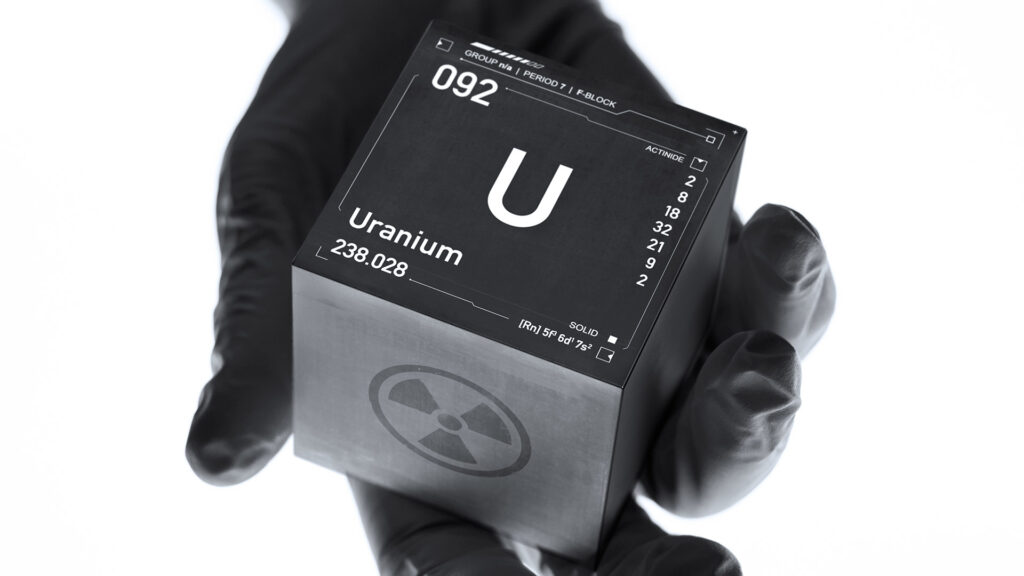Uranium mining and processing stocks, along with an exchange-traded fund, surged on Wednesday following a Reuters report that Russian President Vladimir Putin suggested Russia may restrict exports of uranium, titanium, and nickel in response to Western sanctions over the invasion of Ukraine.
Canada’s Cameco Corp. saw its shares jump 6.4%, while NexGen Energy climbed 4.3%, and Denison Mines rose 5.4%, all in U.S. trading. Cameco leads the group with a market capitalization of $16.5 billion, followed by NexGen at $3.1 billion and Denison at $1.3 billion.
Uranium Energy Corp., with a market cap of $1.9 billion, surged 7.3%, while Centrus Energy, a U.S.-based supplier of enriched uranium valued at $590 million, gained 8.4%.
The Global X Uranium ETF advanced 4.4%, and the Sprott Nickel Miners ETF rose 2.4% in response to the potential export restrictions.
Vladimir Putin suggested that Russia may impose restrictions on exports of key commodities, including uranium, in retaliation against new western sanctions targeting Moscow and its allies.
During a televised meeting with top government officials on Wednesday, Putin remarked, “We should consider placing some limitations on certain goods we supply to the global market… such as uranium, titanium, and nickel.” Any limitations on enriched uranium exports could have significant consequences for western nuclear reactors, many of which have long-term contracts with Russia. Russia is responsible for about one-third of the world’s uranium enrichment capacity and 5% of its uranium mining.
Putin framed the potential export restrictions as a direct response to western pressure, stating, “We’re facing restrictions on imports, so maybe we should think about imposing limitations ourselves.” However, he added a note of caution, saying, “But we must ensure we don’t harm ourselves in the process.”
The suggestion comes amid escalating sanctions from the west against Russia, China, and Iran. Earlier this week, U.S. deputy secretary of state Kurt Campbell accused China of aiding Russia’s “war machine.” While initial sanctions after Russia’s invasion of Ukraine focused on energy products like oil and coal, western allies have recently expanded their measures to include Russian metals exports. The U.S. has banned some Russian-origin metals imports, and key exchanges in the UK and U.S. have ceased trading in new Russian aluminium, copper, and nickel.
Colin Hamilton, a metals analyst at BMO Capital Markets, noted that potential restrictions on uranium exports would be particularly challenging for the industry. “This is something the uranium industry has been fearing,” he said. While the U.S. has already banned imports of Russian enriched uranium, the ban does not affect existing contracts with American utilities.
Russia has previously weaponized its energy exports, cutting gas supplies to the EU in 2022 through the Nord Stream pipeline before it was destroyed in an explosion. Alexandra Prokopenko, a fellow at the Carnegie Russia Eurasia Center, described Putin’s remarks as “a typical threat,” adding that it was a message to the west: “Despite your energy transitions, we’re a key player in rare earth metals, which you need for green energy. We can cut those exports, and your plans will fall apart.”
As western sanctions increase, more of Russia’s exports, including commodities like coking coal and aluminium, are being redirected to China. Russia’s agriculture minister Dmitry Patrushev has also suggested that sanctions have benefited the country’s farming industry by boosting domestic production. Putin noted that after the 2014 western response to Crimea’s annexation, Russia banned many U.S. and EU agricultural imports, which initially led to price increases but later spurred domestic agricultural growth. “A similar process is now happening in the industry,” Putin said.

